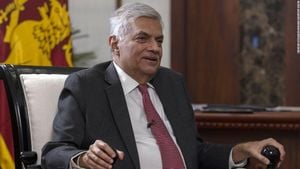Tulsi Gabbard, the former Congresswoman from Hawaii and now Director of National Intelligence nominee, has rapidly shifted from her Democratic roots to become one of Donald Trump’s most controversial cabinet appointments. Her ascent to this pivotal position has generated both intrigue and alarm, raising questions about her views on U.S. foreign policy and the intelligence community she is set to lead.
Gabbard’s selection by Trump to oversee the U.S. intelligence apparatus marks a significant departure not only for her career but also for the political climate as it indicates the former president’s willingness to embrace dissenting voices within his party. Once regarded as one of the more progressive members of Congress, her later actions and statements have led to the assertion from some critics, including former officials and party leaders, labeling her as sympathetic to foreign interests, particularly Russia.
Her controversial past has come under scrutiny. Gabbard gained notoriety after she met with Syrian President Bashar al-Assad during her tenure as a member of Congress. She openly questioned the U.S. government's reasoning for military involvement abroad, often expressing skepticism about American intelligence conclusions. This skepticism often aligned with narratives promoted by Russia and its allies, leading critics to accuse her of being influenced by Kremlin propaganda.
During the Trump administration’s first term, Gabbard stirred up considerable debate with her remarks on foreign policy. For example, she claimed U.S.-funded bioweapons labs existed in Ukraine, connecting those assertions to Russia's grievances about NATO expansion. Her statements closely mirrored conspiracy theories circulated by the Russian government and allied media, igniting fears among intelligence officials about potential security leaks if she were to ascend to the DNI position.
Analysts warn Gabbard’s tenure could shift the dynamics of the Five Eyes alliance, of which the U.S. is a key member along with Canada, Australia, New Zealand, and the United Kingdom. Any whiff of preferential treatment or bias could complicate formal intelligence-sharing operations among these countries, especially as Canada has increasingly relied on intelligence from the U.S. agencies since its own capacity for such analysis has diminished.
Stephanie Carvin, who has expertise on international relations and previously worked with Canadian intelligence agencies, expressed concerns about potential tensions. “[Gabbard's] sentiments,” she said during interviews leading up to the announcement, “tend to reflect conspiracy theories with no evidence, leading us to speculate on how much we could trust any intelligence shared with her being the point of impact.”
Gabbard, who gained national prominence during her presidential bid against Biden, has continually shifted her political identity. Initially, she supported progressive elements within the Democratic Party, endorsed candidates like Bernie Sanders, and advocated for policies such as universal healthcare. Yet, her more recent political realignments have seen her endorse and officially switch to the Republican Party.
The rapidity of her change and her stature within the MAGA sphere raises eyebrows across party lines. Adam Kinzinger, the former Republican congressman, expressed worry about her appointment, echoing sentiments shared by more liberal members of Congress who view Mary Barra’s nomination as emblematic of Trump's “nuanced approach” to governance.
Citing her prior benign connections to Russian propagandist views, Kinzinger stressed, “It’s troubling. To have someone who has peddled Russian talking points at the helm of our intelligence is almost like putting the fox in charge of the hen house.”
Concerns also come from allies abroad. Philip INgram, ex-military intelligence officer, remarked, "Her problematic expressions about Russia will set alarms ringing globally. Should she accept the position, we could see nations being very cautious about how much they share. Trust will be the first casualty."
The intelligence community itself is already on edge, recalling earlier generations when individuals like John Bolton fiercely criticized Obama-era policies. Moving forward, intelligence officials might be more selective about the information they disclose and possibly reconfigure how intelligence is processed, especially with the fear of politicized agendas affecting assessments.
Gabbard will need the approval of GOP senators to secure her position. Though her new affiliation with the Republican Party has garnered her some support, her past staunch anti-interventionist rhetoric leaves several questioning her capacity to effectively represent the intelligence agency. President Trump himself has defended her with passionate remarks about her contributions during military service, saying, "For over two decades, Tulsi has fought for our country and for the freedoms of all Americans." Still, her previous positions have made it difficult for many to disentangle their views.
The dynamics of the transition period also add uncertainty to her candidacy. Just as Gabbard seeks to consolidate her position, Trump’s interpretation of membership within NATO and partnership with old allies is at stake at a moment of strategic geopolitical maneuvering where public opinion and legislative input may prove volatile.
Many within the U.S. intelligence community have spoken against Trump’s previous method of governance, challenged by allegations of political interference during the last administration. With Gabbard’s presidency, critics worry whether there will be accountability for the actions taken, including efforts to possibly alter assessment processes and decisive strategic decisions. Critics have made pointed accusations, labeling both Trump and Gabbard as operating outside the very norms specified within political decorum.
An examination of Gabbard’s military background reveals her deep commitment to duty. Having served as the first Hindu to secure a congressional seat, and with her military career spanning over two decades reaching close to Lt. Colonel rank, she carries both gravitas and challenges within two traditionally male-dominated spheres. Yet, her rise through the institutional ranks contributes to the growing dialogues about representation versus accountability.
Interesting to note is the public perception of Gabbard, especially among young voters who identified her at first as one of the more attractive Democrat candidates. Early critiques both from Republicans and Democrats alike have reshaped how she is perceived, often oscilling toward unsettling dynamics of political opportunism and rates of loyalty vis-à-vis her shifting party affiliations.
Finally, with her new role under scrutiny by lawmakers and citizens alike, Gabbard is likely tasked with overcoming skepticism prevailing within not only her party but also among international partners who may view her as unreliable. The road from Congress to the helm of U.S. intelligence will not be easy, and her capacity to build trust might very well depend on the actions she undertakes from day one as the new Director.
There's no question her nomination has catalyzed discussion around the direction of U.S. intelligence, the integrity of intelligence-gathering, and the geopolitical ramifications stemming from her political leanings. Gabbard's path forward suggests volatility underlying the current political alignments as the U.S. prepares for another chapter under Trump.



